八年级上第九单元
人教版英语八年级上第九单元知识点

Unit 9 Can you come to my party?一、单词及短语1、prepare 动词意为使…做好准备,把…准备好;常用短语①prepare for……为…做准备;其名词形式是preparation 意为准备,准备工作Eg:I can’t go to your party ,because I must prepare for the math exam.The farmers are preparing the ground for planting。
农民们正在为种植准备耕地。
②prepare sb for/to do sth 使某人对……做好准备eg:The teachers are preparing the students for the final examination.老师们正让学生们准备期末考试.He took out a picec of paper and prepared to write to his friend.他拿出一张纸,准备给他的朋友写信。
③prepare sb sth 为某人准备……eg:the host prepared us a delicious meal.主人为我们准备了美味的晚餐.2、exam examination 名词意为考试常见的短语:entrance exam 入学考试pass the exam 通过考试fail the exam 考试及格have /take an exam 参加考试3、have the flu 患感冒have a cold 感冒了have a fever 发高烧have a headache 头痛注意:其中的have不是有的意思,通常意为患有……4、available 形容词意为有空的;可获得的,和free的意义相同be available===be freeEg:I am available (free)in this afternoon. 下午有空。
初中英语人教新目标八年级上册 Unit 9 Can you come to my party知识梳理

八年级英语上册Unit 9 单元知识梳理【Useful expressions】prepare for 为……做准备another time 其他时间hang out 闲逛go to the doctor 去看医生the day after tomorrow 后天the day before yesterday 前天look after 照顾,照看turn down 拒绝,调小take a trip 去旅行help out 解决问题look forward to 期待,期盼hear from sb.收到某人来信come to the party参加聚会have the flu患流感too much homework太多的家庭作业study for a test备考not…until… 直到......才......accept an invitation接受邀请at the end of this month在这个月末go to the concert去听音乐会【Target sentences】1.—Can you come to my party on Saturday afternoon?—Sure, I’d love to./ Sorry, I can’t.I have to prepare for an exam.2.—Can you go to the movies tomorrow night?—Sure.That sounds great.—I’m afraid not.I have the flu.3.—Can he go to the party?—No, he can’t.He has to help his parents.4.—Can she go to the baseball game?—No.she’s not available.She must go to the doctor.5.—Can they go to the movies?—No, they’re not free.They might have to meet their friends.6.—What’s today?—It’s Monday the 14th.7.— What day is it today?—It’s Wednesday.8.—What’s the date today?—It’s December 23rd.9.—What’s today?—It’s Wednesday the 23rd.10.I remember we went bike riding together last fall when he visited you.11.Oh, but Sam isn’t leaving until next Wednesday12.Bring Ms.Steen to the party without telling her so that she can be surprised.13.I look forward to hearing from you all.【Language points】1.prepare for an examprepare for 为……做准备prepare sth.“准备某物”,所准备的东西就是后面的宾语。
八年级上册第九单元2d知识点
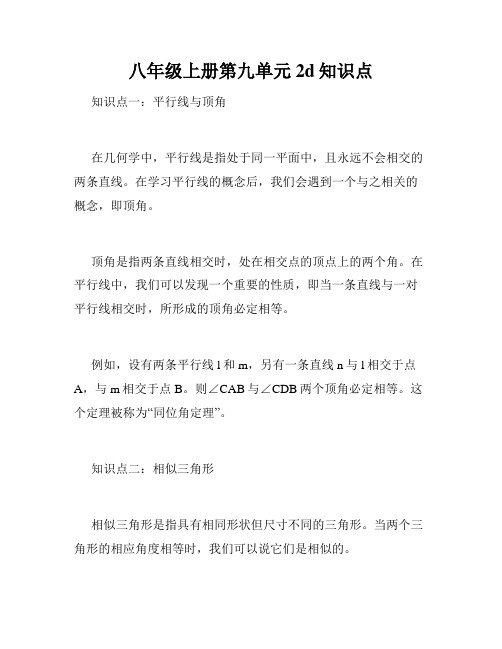
八年级上册第九单元2d知识点知识点一:平行线与顶角在几何学中,平行线是指处于同一平面中,且永远不会相交的两条直线。
在学习平行线的概念后,我们会遇到一个与之相关的概念,即顶角。
顶角是指两条直线相交时,处在相交点的顶点上的两个角。
在平行线中,我们可以发现一个重要的性质,即当一条直线与一对平行线相交时,所形成的顶角必定相等。
例如,设有两条平行线l和m,另有一条直线n与l相交于点A,与m相交于点B。
则∠CAB与∠CDB两个顶角必定相等。
这个定理被称为“同位角定理”。
知识点二:相似三角形相似三角形是指具有相同形状但尺寸不同的三角形。
当两个三角形的相应角度相等时,我们可以说它们是相似的。
通过相似三角形,我们可以推导出一些重要的性质和定理。
例如,如果两个三角形相似,那么它们对应的边长之比将相等。
知识点三:三角形的性质三角形是最基本的几何图形之一,在学习几何学时,我们会接触到一些与三角形性质相关的知识点。
首先是三角形的内角和定理。
这个定理指出,任意一个三角形的三个内角的和等于180度。
例如,对于一个三角形ABC,∠A+∠B+∠C=180度。
其次是三角形的外角和定理。
外角是指一个三角形的两个相邻内角所对应的直角。
根据外角和定理,三角形的一个外角等于它的两个相邻内角的和。
还有一个与三角形的性质相关的定理是余弦定理。
余弦定理可以帮助我们计算一个三角形的某个边的长度。
它表达为:c² = a² + b² - 2abcosC,其中c为斜边,a和b分别为其它两边,C为斜边对应的角度。
知识点四:直角三角形和勾股定理直角三角形是一种特殊的三角形,其中一个角为90度。
直角三角形有一个很重要的定理,称为勾股定理。
根据勾股定理,直角三角形中的斜边的平方等于两个直角边的平方之和。
这个定理可以表示为:c² = a² + b²,其中c为斜边,a 和b分别为直角边。
这个定理在解决与直角三角形相关的问题时非常常用。
最全面人教版八年级上册英语第九单元知识点归纳总结
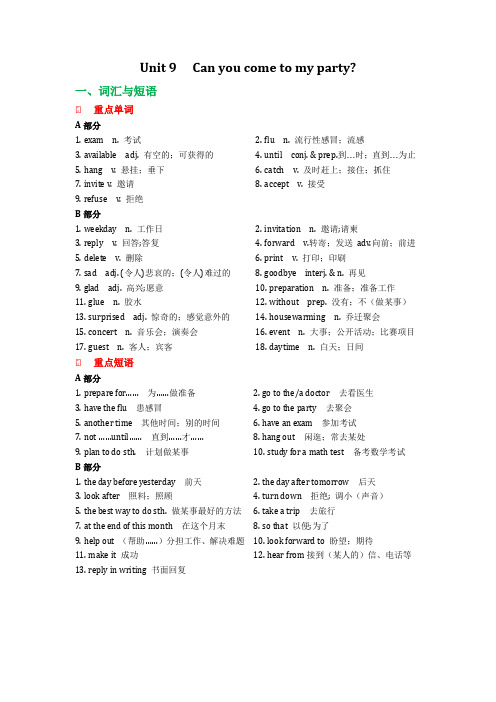
Unit 9 Can you come to my party?一、词汇与短语● 重点单词A部分1.exam n. 考试2.flu n. 流行性感冒;流感3.available adj. 有空的;可获得的4.until conj. & prep.到…时;直到…为止5.hang v. 悬挂;垂下6.catch v. 及时赶上;接住;抓住7.invite v. 邀请8.accept v. 接受9.refuse v. 拒绝B部分1.weekday n. 工作日2.invitation n. 邀请;请柬3.reply v. 回答;答复4.forward v.转寄;发送adv.向前;前进5.delete v. 删除6.print v. 打印;印刷7.sad adj. (令人)悲哀的;(令人)难过的8.goodbye interj. & n. 再见9.glad adj. 高兴;愿意10.preparation n. 准备;准备工作11.glue n. 胶水12.without prep. 没有;不(做某事)13.surprised adj. 惊奇的;感觉意外的14.housewarming n. 乔迁聚会15.concert n. 音乐会;演奏会16.event n. 大事;公开活动;比赛项目17.guest n. 客人;宾客18.daytime n. 白天;日间● 重点短语A部分1.prepare for…… 为……做准备2.go to the/a doctor 去看医生3.have the flu 患感冒4.go to the party 去聚会5.another time 其他时间;别的时间6.have an exam 参加考试7.not ……until…… 直到……才……8.hang out 闲逛;常去某处9.plan to do sth. 计划做某事10.study for a math test 备考数学考试B部分1.the day before yesterday 前天2.the day after tomorrow 后天3.look after 照料;照顾4.turn down 拒绝; 调小(声音)5.the best way to do sth. 做某事最好的方法6.take a trip 去旅行7.at the end of this month 在这个月末8.so that 以便;为了9.help out (帮助……)分担工作、解决难题10.look forward to 盼望;期待11.make it 成功12.hear from接到(某人的)信、电话等13.reply in writing 书面回复● 重点句子A部分1.--Can you come to my party on Saturday? --Sure, I'd love to.--周六你能来参加我的聚会吗?--当然,我想来。
八年级上册9 单元知识点
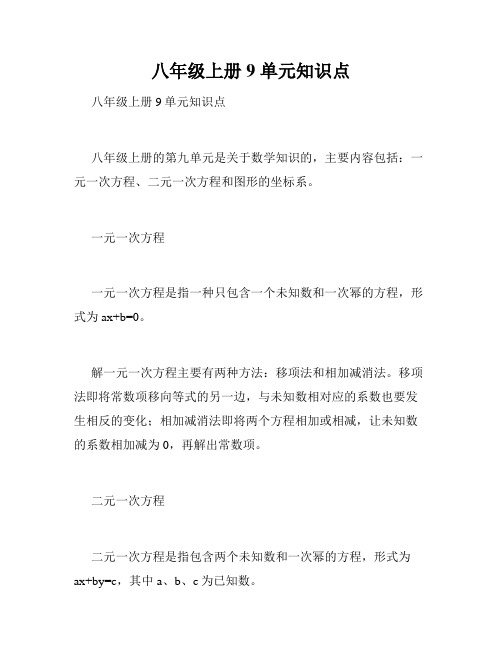
八年级上册9 单元知识点
八年级上册9单元知识点
八年级上册的第九单元是关于数学知识的,主要内容包括:一元一次方程、二元一次方程和图形的坐标系。
一元一次方程
一元一次方程是指一种只包含一个未知数和一次幂的方程,形式为ax+b=0。
解一元一次方程主要有两种方法:移项法和相加减消法。
移项法即将常数项移向等式的另一边,与未知数相对应的系数也要发生相反的变化;相加减消法即将两个方程相加或相减,让未知数的系数相加减为0,再解出常数项。
二元一次方程
二元一次方程是指包含两个未知数和一次幂的方程,形式为ax+by=c,其中a、b、c为已知数。
解二元一次方程的方法也有两种:代入法和消元法。
代入法即
将一个未知数表示为另一个未知数的函数,代入另一个未知数的
方程求解;消元法即通过将两个方程进行相加减消元来解出未知数。
图形的坐标系
图形的坐标系是指在直角坐标系中按一定比例将图形向右平移、上下平移、垂直翻转等操作后所形成的图形。
在图形的坐标系中,我们需要确定坐标轴的起点和比例尺,然
后通过将图形上各个点在坐标轴上的位置表示出来,来对图形进
行描述和移动。
总结
以上是八年级上册的第九单元的主要内容:一元一次方程、二
元一次方程和图形的坐标系。
这些知识点在初中数学中占有重要
地位,是求解问题、解决实际需求的必备工具。
因此,我们需要认真学习并掌握这些知识点,以便在应用中使用。
八年级上英语九单元知识点
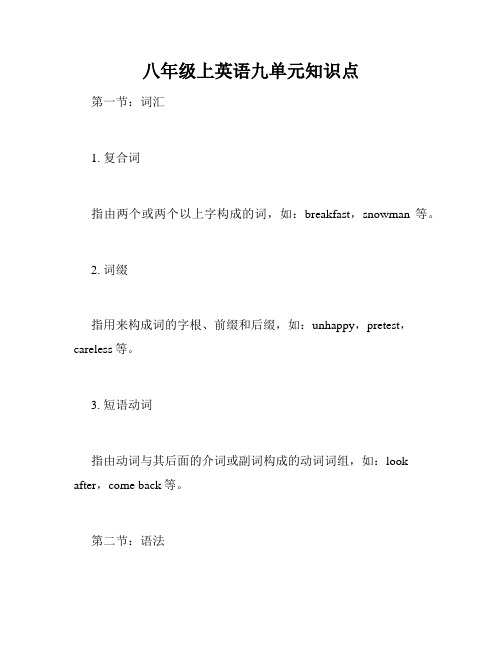
八年级上英语九单元知识点第一节:词汇1. 复合词指由两个或两个以上字构成的词,如:breakfast,snowman等。
2. 词缀指用来构成词的字根、前缀和后缀,如:unhappy,pretest,careless等。
3. 短语动词指由动词与其后面的介词或副词构成的动词词组,如:look after,come back等。
第二节:语法1. 一般现在时用于表示现在的状态、习惯、事实等,如:I always play football on Sundays.2. 现在进行时用于表示正在进行的动作,如:He is playing basketball now.3. 一般过去时用于表示过去的动作或状态,如:I watched TV last night.4. 过去进行时用于表示过去正在进行的动作,如:He was reading a book at 8 o'clock yesterday evening.5. 一般将来时用于表示将来的动作或状态,如:I will go to the park tomorrow.6. be动词的用法表示人或物的状态或特征,如:He is tall.第三节:阅读理解1. 标题排除法通过排除文章的内容,推断出正确的标题。
2. 线索法通过文章中的明显线索,推断出正确的答案或信息。
3. 推断法通过已知信息和推理,推断出未知信息。
第四节:写作技巧1. 合理安排作文结构作文分明确的开头、中间和结尾。
2. 丰富词汇和句子结构用多种不同的词汇和句型结构来增强文章的表达力。
3. 注意作文的连贯性和逻辑性语言表达应该是连贯的,内容也应该有逻辑性。
八年级上册英语第九单元

八年级上册英语第九单元八年级上册Unit9知识点汇总Unit 9 单词prepare [prɪ'per] v.预备;准备exam [ɪɡ'zæm] n.考试available [ə'veɪləbl] a.可得到的;有空的hang [hæŋ] v.悬挂;(使)低垂until [ən'tɪl] conj./prep.直到 ... 的时候;直到…为止catch [kætʃ] v./n.赶上;抓住;捕捉invite [ɪn'vaɪt] v.邀请accept [ək'sept] v.接受refuse [rɪ'fjuːz] v.拒绝invitation [ˌɪnvɪ'teɪʃn] n.邀请;邀请函reply [rɪ'plaɪ] v./n.回答,回复forward ['fɔːrwərd] v.转交;发送adj.向前的adv.向前地delete [dɪ'liːt] v.删除preparation [ˌprepə'reɪʃn] n.准备,准备工作opening ['oʊpnɪŋ] n.开幕式,落成典礼guest [ɡest] n.客人concert ['kɑːnsərt] n.音乐会headmaster [ˌhed'mæstər] n.校长event [ɪ'vent] n.大事,公开活动calendar ['kælɪndər] n.日历,日程表【重点短语】1、on Saturday afternoon 在星期六下午2、have to 必须3、prepare for 准备4、go to the doctor 去看病5、have the flu 患流感6、help my parents 给父母帮忙7、come to the party 参加晚会8、meet my friend 见朋友9、go to the party 参加晚会10、too much homework 太多的家庭作业11、go to the movies 去看电影12、another time 下次,另外的时间,别的时间13、last fall 去年秋天14、hang out 闲逛15、after school 放学后16、on the weekend=on weekends 在周末17、study for a test 备考18、visit grandparents 拜访爷爷奶奶19、the day before yesterday 前天20、the day after tomorrow 后天21、have a piano lesson 上钢琴课22、look after 照看23 make an invitation 制定邀请24、accept an invitation 接受邀请turn down (refuse)an invitation 拒绝邀请25、take a trip to Wuhan 去武汉旅游26、at the end of this month 在本月底27、look forward to + doing 期望/渴望28、the opening of… 开幕/开业29、reply in writing 写回信30、go shopping 购物31、do homework 做作业32、go to the concert 参加音乐会33、not…until… 直到......才......【重点句型】1. --Can you come to my party on Saturday afternoon?星期六下午你能参加我的晚会吗?--Sure, I’d love to. / Sorry,I can’t. I have to prepare for an exam.当然,我愿意去。
人教版英语八年级上unit9听力

人教版英语八年级上unit9听力Unit9Listen is an important part of the eighth grade English curriculum in the People's Education Press.Listening is a crucial skill that helps students improve their English comprehension and language skills.In this article,we will explore the different aspects of Unit9listening,including its importance,types of listening activities,strategies for effective listening,common challenges faced by students,and tips for improving listening skills.Importance of Listening1.1Listening is the foundation of communication in any language.1.2It helps students understand spoken English,improve pronunciation,and expand vocabulary.1.3Listening comprehension is essential for success in exams,daily communication,and future endeavors.Types of Listening Activities2.1Listening to conversations:Students practice understanding everyday dialogues and informal conversations.2.2Listening to lectures:Students focus on understanding longer passages of spoken language,such as lectures or speeches.2.3Listening to instructions:Students learn to follow verbal instructions and carry out tasks accordingly.Strategies for Effective Listening3.1Focus on the main idea:Students should identify the main points of the listening material.3.2Take notes:Writing down key points can help students remember important information.3.3Ask questions:Students should clarify any doubts they have about the listening material.Common Challenges Faced by Students4.1Difficulty understanding accents:Students may struggle with accents different from their own.4.2Lack of concentration:Students often find it challenging to maintain focus during listening activities.4.3Vocabulary barriers:Limited vocabulary can hinder students'understanding of spoken English.Tips for Improving Listening Skills5.1Practice regularly:Students should engage in listening activities regularly to improve their skills.5.2Watch English movies and TV shows:Exposure to different accents and speech patterns can enhance listening comprehension.5.3Use online resources:Online platforms offer avariety of listening exercises and materials for students to practice.In conclusion,Unit9listening in the People's Education Press eighth grade English curriculum plays a significantrole in helping students develop their English language skills.By understanding the importance of listening, engaging in different types of listening activities, employing effective listening strategies,overcoming common challenges,and following tips for improvement,students can enhance their listening comprehension and excel in their English studies.。
八年级上册第九单元
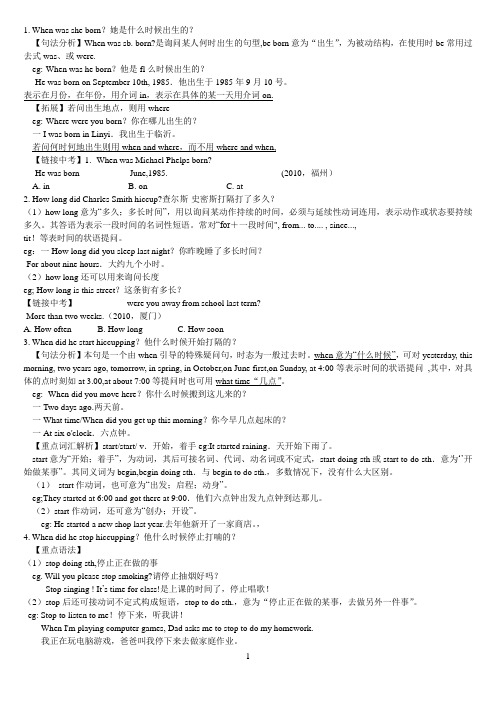
1. When was she born?她是什么时候出生的?【句法分析】When was sb. born?是询问某人何时出生的句型,be born意为“出生”,为被动结构,在使用时be常用过去式was、或were.eg:-When was he born?他是fl么时候出生的?-He was born on September 10th, 1985.他出生于1985年9月10号。
表示在月份,在年份,用介词in,表示在具体的某一天用介词on.【拓展】若问出生地点,则用whereeg:-Where were you born?你在哪儿出生的?一I was born in Linyi.我出生于临沂。
若问何时何地出生则用when and where,而不用where and when,【链接中考】1. -When was Michael Phelps born?-He was born ___________June,1985. (2010,福州)A. inB. onC. at2. How long did Charles Smith hiccup?查尔斯·史密斯打隔打了多久?(1)how long意为“多久;多长时间”,用以询问某动作持续的时间,必须与延续性动词连用,表示动作或状态要持续多久。
其答语为表示一段时间的名词性短语。
常对“for+一段时间", from... to.... , since...,tit!等表时间的状语提问。
eg:一How long did you sleep last night?你昨晚睡了多长时间?-For about nine hours.大约九个小时。
(2)how long还可以用来询问长度eg; How long is this street?这条街有多长?【链接中考】-___________were you away from school last term?-More than two weeks.(2010,厦门)A. How oftenB. How longC. How soon3. When did he start hiccupping?他什么时候开始打隔的?【句法分析】本句是一个由when引导的特殊疑问句,时态为一般过去时。
八年级上册英语第九单元课文

八年级上册英语第九单元课文一、课文原文(人教版八年级上册Unit 9 Can you come to my party?)Section A 2d.Jeff: Hey, Nick, can you come to my house on Saturday? My cousin Sam from Xi'an is going to be here.Nick: Oh, Sam! I remember we went bike riding together last fall whenhe visited you.Jeff: Yes, that's right.Nick: I'd love to come, but I'm afraid I can't. I have an exam on Monday so I must prepare for it.Jeff: That's really too bad! Oh, but Sam isn't leaving until next Wednesday. Can you hang out with us on Monday night?Nick: Sure! Catch you on Monday!3a.Dear Classmates,As I'm sure you know by now, our favorite teacher, Ms. Steen, isleaving soon to go back to the United States. We're very sad that she's leaving because she is a fun teacher. To show how much we're going to miss her, let's have a surprise party for her next Friday the 28th!Can you come to the party? If so, can you help with any of these things? Please tell me by this Friday.1. Buy food and drinks.2. Think of games to play.3. Prepare things we need for the games (like balls, cards, etc.).I look forward to hearing from you all.David.Section B 2b.Hi David,Thanks so much for planning this. I'd love to come to the party, butI'm not available. My family is taking a trip to Wuhan at the end of this month to visit my aunt and uncle. However, I'd still be glad to help out with any of the party preparations, like planning the games. Let me know if you need my help.Jake.Dear classmates,I'm really sorry I can't come to the party. I have a flu. I have to stay at home and rest. I hope you all have a great time!Anna.二、重点词汇。
八年级上册英语第九单元-unit-9知识点及练习题

八上unit 9 短语:on Saturday afternoon have toprepare forgo to the doctor have the fluhelp my parents come to the party meet my friendgo to the partytoo much homework go to the movies another timelast fallhang outafter schoolon the weekend study for a test visit grandparentsthe day before yesterday the day after tomorrow have a piano lesson look afteraccept an invitation turn down an invitation take a tripat the end of this month look forward tothe opening ofreply in writinggo shoppingdo homeworkgo to the concert not…until短语用法:invite sb。
to do sth。
What + a/an + 形容词+ 可数名词单数(+ 主语+ 谓语)!help sb。
(to)do sth What + 形容词+ 名词复数/不可数名词(+ 主语+ 谓语)!be sad to do sth. see sb to do sth / see sb doing sththe best way to do sth. have a surprise party for sblook forward to doing sth. reply to sth/sb。
What’s today?What’s the date today? What day is it today?词语辨析:1. prepare意为“准备”,强调准备的动作与过程。
八年级上册英语第九单元知识点笔记

八年级上册英语第九单元知识点第一部分:语法知识1. 一般过去时在一般过去时中,动词的过去式与其原形有规则变化,如work的过去式是worked,watch的过去式是watched等。
2. 过去进行时过去进行时表示过去某一时刻或某一段时间正在进行的动作,结构为was/were + 动词-ing形式。
3. 现在完成时现在完成时表示过去发生的动作对现在造成的影响或结果,结构为have/has + 过去分词。
4. 过去完成时过去完成时表示在过去某一时间或动作之前已经发生的动作,结构为had + 过去分词。
第二部分:词汇积累1. 教育类词汇educate, knowledge, intelligent, graduate, curriculum, schoolmate, assignment, etc.2. 家庭类词汇family, parent, relative, sibling, household, responsibility, etc.3. 环境类词汇environment, pollution, recycle, conserve, technology, renewable energy, etc.第三部分:阅读能力1. 理解主旨阅读时要注意抓住文章的主旨,理清文章的逻辑关系,找出重要信息。
2. 理解细节细节理解是指通过阅读文章,抓住文章中的具体细节,理解作者想要表达的具体内容。
3. 推断意义通过上下文理解词语、短语或句子的含义,并推断作者的意图和观点。
第四部分:写作技巧1. 书面表达在写作中要注意语言的准确性、连贯性和多样性,使用适当的句式和词汇表达自己的观点。
2. 作文结构写作时要注意文章结构的合理性,包括概述、主体、结论等部分的衔接和过渡。
3. 语法准确在写作中要注意语法的准确性,避免语法错误和用词不当的情况。
第五部分:口语交际1. 口语表达在口语交际中要注意语音、语调和语速的合理运用,以及词汇和句式的多样性。
英语八年级上册第九单元单词知识点
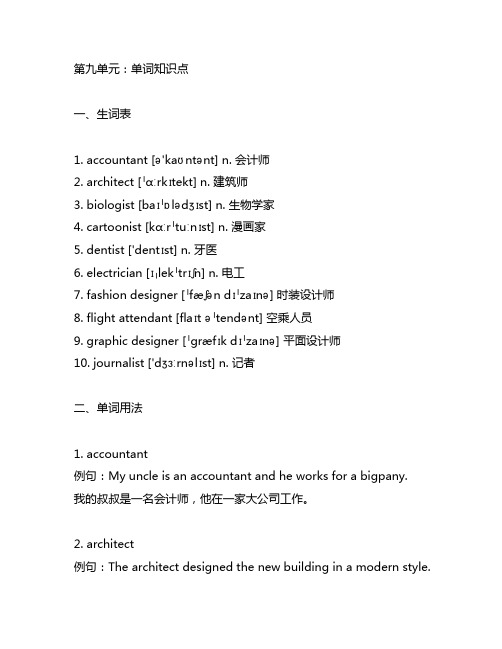
第九单元:单词知识点一、生词表1. accountant [ə'kaʊntənt] n. 会计师2. architect [ˈɑːrkɪtekt] n. 建筑师3. biologist [baɪˈɒlədʒɪst] n. 生物学家4. cartoonist [kɑːrˈtuːnɪst] n. 漫画家5. dentist ['dentɪst] n. 牙医6. electrician [ɪˌlekˈtrɪʃn] n. 电工7. fashion designer [ˈfæʃən dɪˈzaɪnə] 时装设计师8. flight attendant [flaɪt əˈtendənt] 空乘人员9. graphic designer [ˈɡræfɪk dɪˈzaɪnə] 平面设计师10. journalist ['dʒɜːrnəlɪst] n. 记者二、单词用法1. accountant例句:My uncle is an accountant and he works for a bigpany.我的叔叔是一名会计师,他在一家大公司工作。
2. architect例句:The architect designed the new building in a modern style.这位建筑师以现代风格设计了新楼房。
3. biologist例句:The biologist is studying the behaviour of the monkeys in the jungle.这位生物学家正在研究丛林中猴子的行为。
4. cartoonist例句:The cartoonist drew a funny picture of a talking dog.这位漫画家画了一幅讲话的狗的有趣图片。
5. dentist例句:I have to go to the dentist to have my teeth checked.我得去牙医那里检查我的牙齿。
人教版英语八年级上册第九单元Unit9-词组句型作文知识点整理

Invitation
Dear Peter,
I’m going to have my fourteenth birthday party at my house on Nanjing Street. I think it would be great if you can join us. The party is going to last(持续) from 2:30pm to 5:00 on Friday. You can take the No.6 or No.12 bus here. John is going to come. I think you must be happy to meet him. If you can’t find my house, please call me at 852396.
40. by在本单元中是“截止到…为止” 41. go back to 回到 42. have a party for sb 为某人举办派对 43. help with sth 帮助做某事=help to do sth 44. think of 考虑,认为 45. games to play 玩的游戏
I’m really sorry. I will visit you when my mother is at home. Here I say “Happy birthday to you!”
Yours
Jenny
谢谢你的邀请。我很抱歉我不能去你的生日派对。星期天我没有空。我的妈妈在星期日不得 不去上班。并且我不得不在家照顾我的小妹妹因为她太小了。并且我也需要为她准备食物。 我真的很抱歉。当我妈妈在家的时候我将会去看望你。在这里我说“生日快乐”
最全面人教版八年级上册英语第九单元知识点归纳总结

Unit 9 Can you come to my party?一、词汇与短语● 重点单词A部分1.exam n. 考试2.flu n. 流行性感冒;流感3.available adj. 有空的;可获得的4.until conj. & prep.到…时;直到…为止5.hang v. 悬挂;垂下6.catch v. 及时赶上;接住;抓住7.invite v. 邀请8.accept v. 接受9.refuse v. 拒绝B部分1.weekday n. 工作日2.invitation n. 邀请;请柬3.reply v. 回答;答复4.forward v.转寄;发送adv.向前;前进5.delete v. 删除6.print v. 打印;印刷7.sad adj. (令人)悲哀的;(令人)难过的8.goodbye interj. & n. 再见9.glad adj. 高兴;愿意10.preparation n. 准备;准备工作11.glue n. 胶水12.without prep. 没有;不(做某事)13.surprised adj. 惊奇的;感觉意外的14.housewarming n. 乔迁聚会15.concert n. 音乐会;演奏会16.event n. 大事;公开活动;比赛项目17.guest n. 客人;宾客18.daytime n. 白天;日间● 重点短语A部分1.prepare for…… 为……做准备2.go to the/a doctor 去看医生3.have the flu 患感冒4.go to the party 去聚会5.another time 其他时间;别的时间6.have an exam 参加考试7.not ……until…… 直到……才……8.hang out 闲逛;常去某处9.plan to do sth. 计划做某事10.study for a math test 备考数学考试B部分1.the day before yesterday 前天2.the day after tomorrow 后天3.look after 照料;照顾4.turn down 拒绝; 调小(声音)5.the best way to do sth. 做某事最好的方法6.take a trip 去旅行7.at the end of this month 在这个月末8.so that 以便;为了9.help out (帮助……)分担工作、解决难题10.look forward to 盼望;期待11.make it 成功12.hear from接到(某人的)信、电话等13.reply in writing 书面回复● 重点句子A部分1.--Can you come to my party on Saturday? --Sure, I'd love to.--周六你能来参加我的聚会吗?--当然,我想来。
人教版八年级上册第九单元知识点全八上unit9知识点
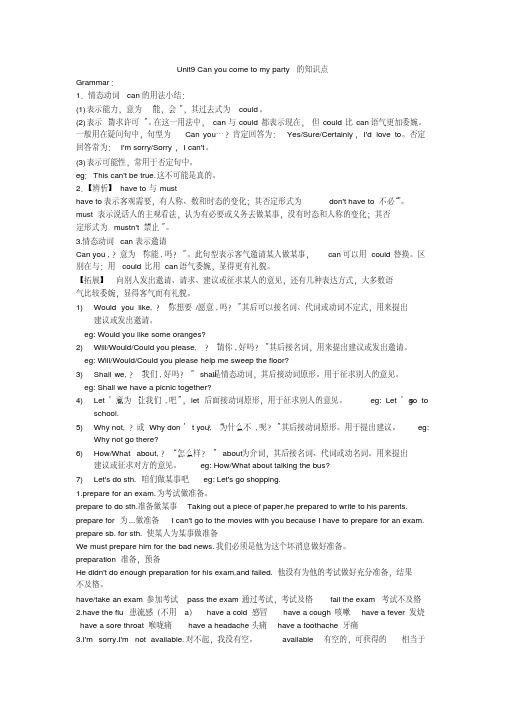
Unit9 Can you come to my party的知识点Grammar:1.情态动词can的用法小结:(1)表示能力,意为“能,会”,其过去式为could。
(2)表示“请求许可”。
在这一用法中,can与could都表示现在,但could比can语气更加委婉。
一般用在疑问句中,句型为Can you…?肯定回答为:Yes/Sure/Certainly,I'd love to。
否定回答常为:I'm sorry/Sorry,I can't。
(3)表示可能性,常用于否定句中。
eg:This can't be true.这不可能是真的。
2.【辨析】have to与must不必”。
have to表示客观需要,有人称、数和时态的变化;其否定形式为don't have to“must表示说话人的主观看法,认为有必要或义务去做某事,没有时态和人称的变化;其否定形式为mustn't“禁止”。
3.情态动词can表示邀请Can you ,?意为“你能,吗?”。
此句型表示客气邀请某人做某事,can可以用could替换。
区别在与:用could比用can语气委婉,显得更有礼貌。
【拓展】向别人发出邀请、请求、建议或征求某人的意见,还有几种表达方式,大多数语气比较委婉,显得客气而有礼貌。
1)Would you like,?“你想要/愿意,吗?”其后可以接名词、代词或动词不定式,用来提出建议或发出邀请。
eg: Would you like some oranges?2)Will/Would/Could you please,?“请你,好吗?”其后接名词,用来提出建议或发出邀请。
eg: Will/Would/Could you please help me sweep the floor?3)Shall we,?“我们,好吗?”shall是情态动词,其后接动词原形。
用于征求别人的意见。
八年级上册人教版第九单元单词

第一部分:词汇表1.1 动词1.1.1 attend [ə'tend] v. 参加,出席1.1.2 playground ['pleɪgraʊnd] n. 操场1.1.3 club [klʌb] n. 俱乐部1.1.4 subject ['sʌbdʒɪkt] n. 学科1.1.5 skateboard ['skeɪtbɔd] n. 滑板1.1.6 travel ['trævəl] v. 旅行1.2 名词1.2.1 temperature ['temprɪtʃə] n. 温度1.2.2 keyboard ['kiːbɔrd] n. 键盘1.2.3 knowledge ['nɒlɪdʒ] n. 知识1.2.4 height [haɪt] n. 高度1.2.5 weight [weɪt] n. 重量1.3 形容词1.3.1 active ['æktɪv] adj. 积极的1.3.2 fortable ['kʌmftəbl] adj. 舒适的1.3.3 generous ['dʒenərəs] adj. 慷慨的1.3.4 healthy ['helθi] adj. 健康的1.3.5 useless ['juːslɪs] adj. 无用的1.4 副词1.4.1 d本人ly ['deɪlɪ] adv. 每天1.4.2 easily ['iːzɪlɪ] adv. 容易地1.4.3 heavily ['hevɪlɪ] adv. 大量地1.4.4 possibly ['pɒsəblɪ] adv. 可能地1.4.5 suddenly ['sʌdənlɪ] adv. 突然地第二部分:典型句型2.1 What’s the temperature like in summer in your city?在你们城市夏天的温度是多少?2.2 How much does the skateboard cost?这个滑板多少钱?2.3 Would you like to join theputer club?你想加入电脑俱乐部吗?2.4 It’s very difficult to do it.做这件事情很困难。
八年级上册第九单元单词

八年级上册第九单元单词Unit 9 Can you come to my party?1. prepare [prɪ'peə(r)] v. 使做好准备;把……准备好2. exam [ɪɡ'zæm] n. 考试3. flu [fluː] n. 流行性感冒;流感4. available [ə'veɪləbl] adj. 有空的;可获得的5. until [ən'tɪl] conj. prep. 到……时;直到……为止6. hang [hæŋ] v. 悬挂;垂下 (hung [hʌŋ])7. catch [kætʃ] v. 及时赶上;接住;抓住8. invite [ɪn'vaɪt] v. 邀请9. accept [ək'sept] v. 接受10. refuse [rɪ'fjuːz] v. 拒绝11. the day before yesterday 前天12. the day after tomorrow 后天13. weekday ['wiːkdeɪ] n. 工作日(星期一至星期五的任何一天)14. look after 照料;照顾15. invitation [ˌɪnvɪ'teɪʃn] n. 邀请;请柬16. reply [rɪ'plaɪ] v. 回答;答复17. forward ['fɔːwəd] v. 转寄;发送;adv. 向前;前进18. delete [dɪ'liːt] v. 删除19. print [prɪnt] v. 打印;印刷20. sad [sæd] adj. (令人)悲哀的;(令人)难过的21. goodbye [ˌɡʊd'baɪ] int. n. 再见22. glad [ɡlæd] adj. 高兴;愿意23. preparation [ˌprepə'reɪʃn] n. 准备;准备工作24. glue [ɡluː] n. 胶水25. without [wɪ'ðaʊt] prep. 没有;不(做某事)26. surprised [sə'praɪzd] adj. 惊奇的;感觉意外的27. look forward to 盼望;期待28. hear from 接到(某人的)信、电话等。
八年级上英语第九单元知识点
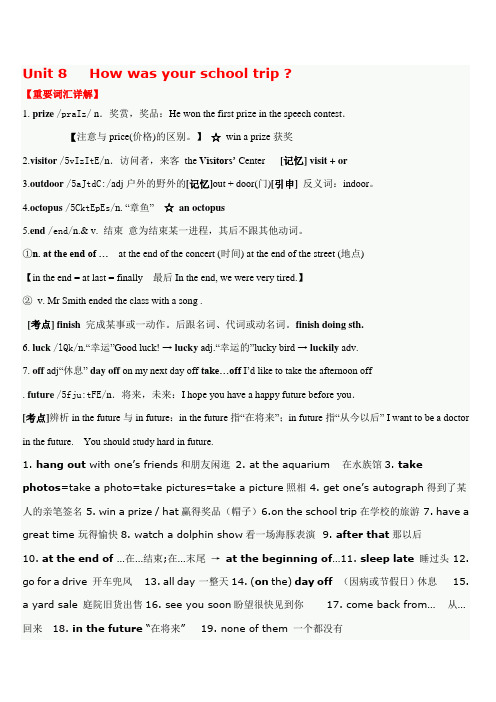
Unit 8How was your school trip ?【重要词汇详解】1. prize /praIz/n.奖赏,奖品:He won the first prize in the speech contest.【注意与price(价格)的区别。
】☆win a prize获奖2.visitor /5vIzItE/n.访问者,来客the Visitors’ Center [记忆] visit + or3.outdoor /5aJtdC:/adj户外的野外的[记忆]out + door(门)[引申] 反义词:indoor。
4.octopus /5CktEpEs/n. “章鱼” ☆an octopus5.end /end/n.& v. 结束意为结束某一进程,其后不跟其他动词。
①n. at the end of … at the end of the concert (时间) at the end of the street (地点)【in the end = at last = finally 最后In the end, we were very tired.】②v. Mr Smith ended the class with a song .[考点] finish 完成某事或一动作。
后跟名词、代词或动名词。
finish doing sth.6. luck /lQk/n.“幸运”Good luck! → lucky adj.“幸运的”lucky bird → luckily adv.7. off adj“休息” day off on my next day off take…off I’d li ke to take the afternoon off. future /5fju:tFE/n.将来,未来:I hope you have a happy future before you.[考点]辨析in the future与in future:in the future指“在将来”;in future指“从今以后” I want to be a doctor in the future. You should study hard in future.1. hang out with one’s friends和朋友闲逛2. at the aquarium 在水族馆3. takephotos=take a photo=take pictures=take a picture照相4. get one’s autograph得到了某人的亲笔签名 5. win a prize / hat赢得奖品(帽子)6.on the school trip在学校的旅游 7. have a great time 玩得愉快8. watch a dolphin show看一场海豚表演 9. after that那以后10. at the end of…在…结束;在…末尾→at the beginning of…11. sleep late睡过头 12. go for a drive 开车兜风13. all day 一整天14. (on the) day off (因病或节假日)休息15.a yard sale 庭院旧货出售16. see you soon盼望很快见到你17. come back from…从…回来18. in the future “在将来” 19. none of them 一个都没有1. What did you do on your school trip?2. Did you go to the zoo? No., I didn’t. I went to the aquarium.3. Did you see any seals? Yes, I saw some seals.4. Were there any sharks? No, there weren’t any sharks; but there were some really smar t seals.5. What else did you do?6. How was your day off?一般过去时:主要用来表示过去发生的动作或状态。
八年级上九单元知识点

八年级上九单元知识点探究作为学生,学习是我们每天的主要任务,而掌握知识点则是学习的关键。
在八年级上册的九个单元中,每个单元都有着重要的知识点需要我们掌握。
在本文中,我们将探究这些知识点,并探讨它们的实际应用。
一、数学知识点数学作为一门基础学科,始终伴随着我们的学习生活。
在八年级上册的数学单元中,我们学习了诸如代数式的运算、多边形的性质、线性方程组等知识点。
其中,代数式的运算是建立在代数知识基础上的,我们需要了解代数式中的变量、系数和指数,并通过运算掌握多项式的加减乘除。
此外,多边形的性质也是我们需要熟练掌握的知识点,我们可以通过理解多边形的边、角以及对称性来应用几何知识解决问题。
线性方程组则是建立在一元一次方程的基础上的,通过多个方程的组合解决问题。
这些数学知识点都是我们未来学习数学的基础,掌握了这些知识点,我们就能够更好地理解和运用数学。
二、物理知识点物理作为一门自然科学,研究物质的本质和规律。
在八年级上册的物理单元中,我们学习了很多关于运动的知识,例如物体的运动状态、速度和加速度的概念等。
掌握这些知识点,我们能够更好地理解物体的运动规律,从而解决实际生活中的问题。
另外,我们还学习了光的传播规律、反射和折射等知识点。
光是人类视觉的重要来源,了解光的性质有助于我们更好地处理光的传播和反射问题。
通过实验和观察,我们可以应用物理知识解释光的传播过程,解决真实世界中的光学问题。
三、化学知识点化学是研究物质的组成、结构、性质和变化的科学。
在八年级上册的化学单元中,我们学习了许多基本的化学概念,例如物质的分类、分子的组成、化学式的表示等。
同时,我们也了解了一些化学变化的规律,如物质的溶解、燃烧和酸碱中和等。
这些化学知识点使我们对物质的本质和化学反应有了更深入的了解,并能够应用化学知识来解释实际生活中的现象和问题。
例如,在日常生活中,我们可以通过了解物质的溶解性来选择合适的溶剂,使得我们能够更好地处理溶液的制备和分离。
- 1、下载文档前请自行甄别文档内容的完整性,平台不提供额外的编辑、内容补充、找答案等附加服务。
- 2、"仅部分预览"的文档,不可在线预览部分如存在完整性等问题,可反馈申请退款(可完整预览的文档不适用该条件!)。
- 3、如文档侵犯您的权益,请联系客服反馈,我们会尽快为您处理(人工客服工作时间:9:00-18:30)。
Unit 9 Can you come to my party?一、单词及短语【短语归纳】1)on Saturday afternoon 在周六下午2)have to 不得不3)prepare for 为……做准备4)go to the doctor去看医生5)have the flu患感冒6)help my parents 帮助我的父母7)come to the party 来参加聚会8)meet my friend 会见我的朋友9)go to the party 去聚会10)too much homework 太多作业11)go to the movies 去看电影12)another time 其他时间13)last fall 去年秋天14)hand out 闲逛;常去某处15)after school 放学后16)on the weekend 在周末17)visit grandparents 拜访祖父母18)study for a test 为考试学习19)the day before yesterday 前天20)the day after tomorrow 后天21)have a piano lesson 上钢琴课22)look after 照看;照顾23)accept an invitation 接受邀请24)turn down an invitation拒绝邀请25)take a trip 去旅行26)at the end of this month 在这个月末27)look forward to 期盼;期待28)the opening of…… ……的开幕式或落成典礼29)reply in writing 书面回复30)go shopping 去购物31)do homework做家庭作业32)go to the concert 去听音乐会33)not……until 直到……才【用法集粹】1)invite sb.to do sth. 邀请某人做某事2)what 引导的感叹句结构: What +a /an +形容词+可数名词单数(+主语+谓语)!What +形容词+名词复数/不可数名词(+主语+谓语)!3)help sb.(to) do sth. 帮助某人做某事4)be sad to do sth. 做某事很悲伤5)see sb. do sth. 看见某人做某事see sb. doing sth. 看见某人正在做某事6)the best way to do sth. 做某事最好的方式7)have a surprise party for sb. 为某人举办一个惊喜派对8)look forward to doing sth. 期盼做某事9)reply to sth. / sb. 答复某人/某事10)What’s today? 今天是什么日子?What’s the date today? 今天是几月几号?What day is it today? 今天是星期几?二、知识点讲解1、prepare 动词意为使…做好准备,把…准备好;常用短语①为…做准备;其名词形式是意为准备,准备工作Eg:I can’t go to your party ,because I must prepare for the math exam.The farmers are the ground planting。
农民们正在为种植准备耕地。
②使某人对……做好准备eg:The teachers are preparing the students for the final examination.老师们正让学生们准备期末考试.He took out a picec of paper and prepared (write)to his friend.他拿出一张纸,准备给他的朋友写信。
③为某人准备……eg:the host prepared us a delicious meal.主人为我们准备了美味的晚餐.2、exam examination 名词意为考试常见的短语:入学考试通过考试考试不及格参加考试3、have the flu 患感冒have a cold 感冒了have a fever 发高烧have a headache 头痛注意:其中的have不是有的意思,通常意为患有……4、available 形容词意为有空的;可获得的,和free的意义相同be available===Eg:I am available (free)in this afternoon. 下午有空。
----Can you come to my party this evening?----sorry, I’m not available(free) .Maybe another time.5、untiluntil“直到”,表示某一种行为一直持续到某一时间。
用在肯定句中,句子的谓语动词必须是可延续性的。
not...until“直到...才”表示直到某一时间,某一行为才发生,之前该行为并没有发生. 用在否定句中,主句中的谓语可以是延续性的也可以是短暂性动词。
eg: I studied Englis until 9 o'clock last night. 我咋晚学英语一直学到9点钟.(表示9点前一直在学)I did not study Englis until 9 o'clock last night. 我咋晚直到9点钟才学英语.(表示9点才开始学)I waited for five hours until it was dark. I had to give it up.我等了五个小时直到天黑了,不得不放弃。
I didn't go to sleep until 11 o'clock 我知道九点钟才睡觉。
He lived with his parents until he get married。
他和父母住知道他结婚为止。
6、hang 动词意为悬挂,垂下过去式是hung常见短语:外出闲逛。
泡在某处紧紧抓住挂在…上挂断电话;悬挂,挂起Eg:He likes reading and he often hangs out the bookshop.他喜欢阅读,并且他尝尝去书店。
Hang the picture on the wall. 把这幅画挂在墙上。
7、catch 动词意为追上,赶上;其三单形式为catches 过去式为caught常用短语为追赶上… likesEg:The cat likes catching the mice.猫喜欢抓老鼠。
You have to work hard to catch up with the top students in your class.要赶上班上的优秀学生,你的更加努力才行。
9、I’m afraid…… 意为恐怕……,表示推测令人不愉快的事情。
表示否定时为恐怕不能表示肯定是为恐怕如此Eg:----Look at the clouds,It looks like rain.看那些云,看起来像是要下雨了。
---- I’m afraid so. 恐怕是这样的。
----Can you go to the concert?你能去音乐会吗?---- I’m sorry,I’m afraid not.抱歉,恐怕去不了。
10、invite 动词意为邀请名词形式是invitation 意为邀请函,邀请常见的短语有:邀请某人去某地邀请某人做某事Eg:My best friend invite me to her hometown. 我的好朋友邀请我去她的家乡。
Yesterday Anna invite me to watch the film. 昨天安娜邀请我去看电影。
You should look after the dog well. 你应该好好照顾这只小狗。
你应该好好照顾这只小狗。
13、egI helped my sister (to ) clean the room yesterday. 我昨天帮助我的姐姐打扫房间。
Anna often helps her mother with housework. 安娜经常帮助她妈妈做家务。
Miss Lee often helps me with my English. 李老师经常在英语方面帮助我。
Help to yourself some fruit. 你随便吃些水果吧!!14、sad 形容词意为悲伤地,伤心的This story made me very sad . 这个故事让我很伤心。
It’s sad to hear this bad news. 听到这个坏消息,我很伤心。
注意:对于谁来说做…是…的15、see (看见)hear(听见)watch(看见)看见过/听见过某人做…… 后接动词原形see (看见)hear(听见)watch(看见)看见/听见某人正在做…… 后接动名词eg:I often see the boy play basketball in the park. 我经常看见那个男孩在公园里打篮球。
They can always hear her sing in the next room。
他们经常能听到她在隔壁房间唱歌。
Lilei watched the chief take the old man’s phone. 李磊看见这个小偷偷了那个那人的手机。
When I look out the window, I see a bird standing om the tree..当我向窗外看的时候,看到一只鸟站在树上。
I heard my parents and my English talking in the garden. 我听到我的父母和我的英语老师在花园里谈话。
16、短语辨析:在……的末尾,在……尽头到……末为止最后,终于==at lasteg:You can see a bookshop at the end of the road. 在路的尽头你会看到一家书店。
At the end of this month, we’ll have an exam. 这个月末,我们将会举行考试。
He found his book in the end.(at last) 最后他找到了他的书。
17、without 介词意为没有,不(做某事),后接动名词,代词宾格或名词Eg:He goes out without hat. 他没戴帽子就出去了。
My father left the room without a word. 我爸爸一句话都没说就离开了房间。
